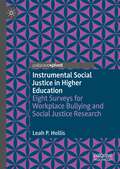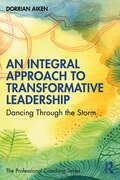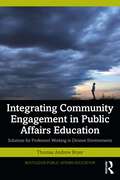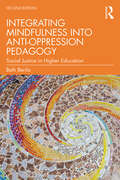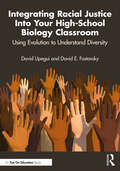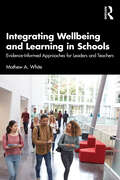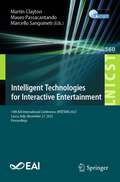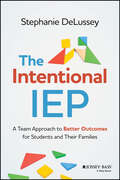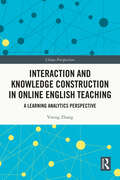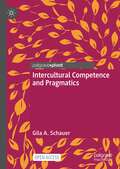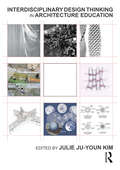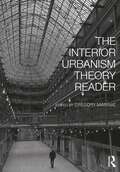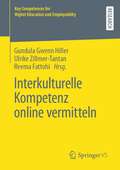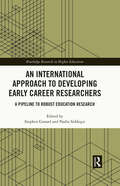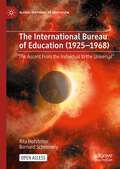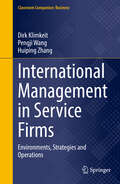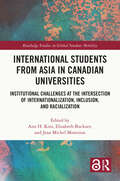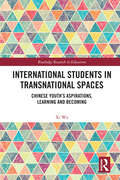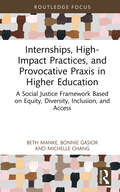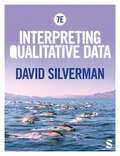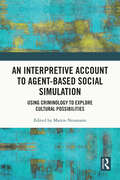- Table View
- List View
Instrumental Social Justice in Higher Education: Eight Surveys for Workplace Bullying and Social Justice Research
by Leah P. HollisThis book offers eight validated instruments on workplace bullying to support robust mixed methods approaches for social justice research. Workplace bullying is an excellent starting point from which scholars can consider social justice research. The data shows that marginalized and disenfranchised groups (minoritized groups, women, junior faculty, and the LGBTQ+ community) are disproportionately affected. The outcomes included career interruption and severe health disparities. Though there is a demand for workplace bullying instruments, the book also lays a foundation for creating surveys to address these populations more effectively.
An Integral Approach to Transformative Leadership: Dancing Through the Storm
by Dorrian AikenThis essential new book is a practical "how-to" guide to enhancing the quality of relationships between leaders and individuals in organisations – the proven key to maximising performance, building resilience, and retaining talent. Integral vision, seen through each of the four quadrants described in this book, gives access to a range of perspectives, irreducible to one another but each significant in adding a kaleidoscope of understanding to a topic or body of knowledge. The author draws on recent research which focuses on Integral theory and emphasises the benefits to an organisation, including cultivating, at several levels, leaders and teams through coaching, improving the quality of meetings, introducing an understanding of emotional intelligence, and more recently, addressing adult stages of development. The book also demonstrates how the Integral quadrants can bring clarity to interpersonal and cross-sector communication, especially in diagnosing, planning, and implementing team and organisational strategy. The concepts and practical skills explored in this book will be a valuable resource for senior leaders, human resources specialists, and in-house and external coaches focusing on leadership development, as well as students and trainers of coaching.
Integrating Community Engagement in Public Affairs Education: Solutions for Professors Working in Divisive Environments (Routledge Public Affairs Education)
by Thomas Andrew BryerCommunity engaged universities prepare students to participate in societies in ways that are inclusive. This book presents a coherent argument for higher education institutions not only to encourage students to engage in their communities, but also to develop themselves as community engaged institutions. Analyzing the design and implementation of community engaged teaching and learning practices, author Thomas Bryer explores training in democratic practices and envisions a future in which higher education institutions are better prepared to cope with democratic backsliding.Teaching and professional development cases are woven throughout—developed, adapted, and enhanced by the author over a period of years—and grounded in the great debates happening today. Integrating Community Engagement in Public Affairs Education is a culmination of multiple years of experimentation with different approaches to teaching future and practicing public sector leaders the tools of democratic engagement. The text is grounded in a case‑based design that spans undergraduate, Master’s, and Ph.D. students, as well as local government managers, offering concrete examples of teaching and learning strategies that promote public value and measurable social impact. The book closes with practical strategies for publicly engaged scholars to effectively educate the next generation of students about democratic engagement within divided communities. It will be required reading for public administration faculty, as well as practicing public administrators and those who provide training to them.
Integrating Mindfulness into Anti-Oppression Pedagogy: Social Justice in Higher Education
by Beth BerilaDrawing from mindfulness education and social justice teaching, this book explores an effective Anti-Oppression pedagogy for university and college classrooms. Authentic classroom discussions about oppression and diversity can be difficult; a mindful approach allows students to explore their experiences with compassion and to engage in critical inquiry to confront their deeply held beliefs and value systems. This engaging book is full of practical tips for deepening learning, addressing challenging situations, and providing mindfulness practices in anti-oppression classrooms. In this fully revised edition, Dr. Berila positions discussion in the current context and expands exploration of power and implicit bias, transformative learning, and trauma. Integrating Mindfulness into Anti-Oppression Pedagogy is for all higher education professionals interested in and teaching Social Justice pedagogy that empowers and engages students in the complex unlearning of oppression.
Integrating Racial Justice Into Your High-School Biology Classroom: Using Evolution to Understand Diversity
by David Upegui David E. FastovskyIn this guide, educators and authors David Upegui and David E. Fastovsky offer a pedagogical prescription for how you can integrate the study of racial justice with evolutionary biology in your existing high-school biology curriculum. Designed as a practical manual for teaching, the chapters focus on teaching concepts of equity through evolutionary biology modules, a cornerstone for building students’ scientific understanding of biotic diversity. The book provides pedagogical components alongside historical and scientific components, with contextual chapters that give teachers the background knowledge to understand the historical relationship between science and racism for topics such as natural selection, social justice, and American slavery and colonization. Ready-to-use lesson plans are situated in a historical and theoretical context of science as it relates to racial oppression, and demonstrate how rigorous science education can lead to your students’ liberation and personal empowerment despite the historically problematic history of some applications of science. These lesson plans and classroom exercises are presented in a way that introduces the timely extra dimension of anti-racism into the existing biology curricula without significantly increasing teaching loads. The contextual material provided allows the lessons to be implemented across a variety of classrooms regardless of initial familiarity with DEI. Ideal for secondary biology teachers and their students, particularly in grades 10-12, this book synthesizes timely ideas for high-school educators, harnessing the power of rigorous science to combat marginalization. Lessons and activities have been classroom-tested and are aligned with three different standards: Next Generation Science Standards (NGSS); College board (AP Biology); Vision and Change; and use the 5E format.
Integrating Racial Justice Into Your High-School Biology Classroom: Using Evolution to Understand Diversity
by David Upegui David E. FastovskyIn this guide, educators and authors David Upegui and David E. Fastovsky offer a pedagogical prescription for how you can integrate the study of racial justice with evolutionary biology in your existing high-school biology curriculum.Designed as a practical manual for teaching, the chapters focus on teaching concepts of equity through evolutionary biology modules, a cornerstone for building students’ scientific understanding of biotic diversity. The book provides pedagogical components alongside historical and scientific components, with contextual chapters that give teachers the background knowledge to understand the historical relationship between science and racism for topics such as natural selection, social justice, and American slavery and colonization. Ready-to-use lesson plans are situated in a historical and theoretical context of science as it relates to racial oppression, and demonstrate how rigorous science education can lead to your students’ liberation and personal empowerment despite the historically problematic history of some applications of science. These lesson plans and classroom exercises are presented in a way that introduces the timely extra dimension of anti-racism into the existing biology curricula without significantly increasing teaching loads. The contextual material provided allows the lessons to be implemented across a variety of classrooms regardless of initial familiarity with DEI.Ideal for secondary biology teachers and their students, particularly in grades 10-12, this book synthesizes timely ideas for high-school educators, harnessing the power of rigorous science to combat marginalization. Lessons and activities have been classroom-tested and are aligned with three different standards: Next Generation Science Standards (NGSS); College board (AP Biology); Vision and Change; and use the 5E format.
Integrating Wellbeing and Learning in Schools: Evidence-Informed Approaches for Leaders and Teachers
by Mathew A. WhiteIntegrating Wellbeing and Learning in Schools argues that wellbeing research can help address the hurdles that school leaders face by incorporating a more interdisciplinary approach from contemporary governance, leadership, and management. The COVID-19 pandemic has accelerated the problem of the wellbeing learning poverty cycle in schools worldwide. This book makes the case for a new and comprehensive integration of wellbeing in school governance, leadership, and teaching theories across disciplines during the recovery phase of the COVID-19 pandemic. It argues for operationalising wellbeing goals and integrating these into evidence-informed professional practice. Drawing on evidence-informed wellbeing education, teaching theories, and original research, the book comprehensively considers the integration of wellbeing education from the perspectives of school governance and leadership, middle management, teachers, student leadership, and the students themselves. This book will be of interest to postgraduate students of education leadership, educators, and school leaders.
Intelligent Technologies for Interactive Entertainment: 14th EAI International Conference, INTETAIN 2023, Lucca, Italy, November 27, 2023, Proceedings (Lecture Notes of the Institute for Computer Sciences, Social Informatics and Telecommunications Engineering #560)
by Martin Clayton Mauro Passacantando Marcello SanguinetiThis book constitutes the refereed proceedings of the 14th International Conference on Intelligent Technologies for Interactive Entertainment, INTETAIN 2023 which was held in Lucca, Italy, during November 27, 2023.The 15 full papers presented in this book were selected from 56 submissions. They present novel and innovative work in areas of methods (machine learning, movement), computer-based systems (architectures, software, algorithms), and devices (digital cameras, smartphones). The papers are grouped in sessions of thematic issues on Games and Game-Based learning; Motion Capture; Sports and Competitions; and Interfaces and Applications.
The Intentional IEP: A Team Approach to Better Outcomes for Students and Their Families
by Stephanie DeLusseyLearn how to put together IEPs with the power to make a real difference for students The Intentional IEP shows special education teachers how to successfully collaborate with all stakeholders—parents or guardians, general ed teachers, therapists, and beyond—to work toward students’ success. Too many of us aren’t trained to write the Individualized Education Programs that help millions of students with thrive in school. This book fills that training gap, explaining the importance of assembling an IEP team and inviting this team to confront and improve its current processes and habits to make IEP writing simpler and more effective. With all the pressures that educators are under, it’s easy to cut corners when it comes time towrite IEPs. Writing them in isolation, leaving them to the night before, making decisions without consulting data and research, letting family collaboration fall to the wayside—most special educators have made these mistakes at some point. The Intentional IEP equips you with the resources you need to feel confident in approaching IEPs the right way, including prioritizing the many competing demands you face so you can find the capacity to show up for your students. This book offers: Clear, step-by-step solutions for all IEP members that can easily be implemented at any time during the school year Collaboration strategies for IEP teammates to rely on one another for expert and professional knowledge Tools and reproducibles to strengthen practices and overcome common hurdles Direct advice from a veteran special education teacher who has seen what a difference collaboration in the IEP can make for studentsThe Intentional IEP is a timely resource for special education teachers, general education teachers, and support staff, as well as teachertraining programs. Parents and guardians with students will also benefit from this clearly written guide to the IEP.
Interaction and Knowledge Construction in Online English Teaching: A Learning Analytics Perspective (China Perspectives)
by Yining ZhangWithin a Chinese English as a Foreign Language (EFL) learning context, this book investigates how teachers and learners interacted and articulated their understanding of English for Research Publication Purposes (ERPP)-related knowledge in a synchronous EFL classroom.The outbreak of the COVID-19 Pandemic changed the way people receive education, causing an almost overnight switch from on-campus instruction to distance learning. Under the use of three different learning analytics approaches, this book has moved beyond the usual descriptive understanding of the online learning process to an in-depth exploratory and inferential analysis of the entities, structures, relations, and processes of learning. The findings enrich current understandings of the complexity of ERPP teaching and learning in synchronous learning contexts. These findings also drive us to rethink and reshape the way ERPP instruction is delivered post-pandemic. An essential read for students and scholars of education and academic English. This book will also be a vital source for researchers in the field of learning analytics, data analysis, and data interpretation in language teaching and learning.
Interaction and Knowledge Construction in Online English Teaching: A Learning Analytics Perspective (ISSN)
by Yining ZhangWithin a Chinese English as a Foreign Language (EFL) learning context, this book investigates how teachers and learners interacted and articulated their understanding of English for Research Publication Purposes (ERPP)-related knowledge in a synchronous EFL classroom.The outbreak of the COVID-19 pandemic changed the way people receive education, causing an almost overnight switch from on-campus instruction to distance learning. Under the use of three different learning analytics approaches, this book has moved beyond the usual descriptive understanding of the online learning process to an in-depth exploratory and inferential analysis of the entities, structures, relations, and processes of learning. The findings enrich current understandings of the complexity of ERPP teaching and learning in synchronous learning contexts. These findings also drive us to rethink and reshape the way ERPP instruction is delivered post-pandemic.An essential read for students and scholars of education and academic English. This book will also be a vital source for researchers in the field of learning analytics, data analysis, and data interpretation in language teaching and learning.
Intercultural Competence and Pragmatics
by Gila A. SchauerThis Open Access book examines the link between intercultural competence (IC) and pragmatics by asking frontline modern foreign language teachers in higher education teaching a variety of languages (e.g., Dutch, English, French, German, Italian, Spanish, Swedish) how they conceptualise intercultural competence and which skills, competences and knowledge they consider important in their teaching contexts. The data were collected with an online survey that focused on the relationship between intercultural competence and pragmatics.While international organizations such as the United Nations Educational, Scientific and Cultural Organization (UNESCO) or the Council of Europe (CoE) agree that intercultural competence should play an important role in education, it is not always clear what IC may encompass in specific teaching contexts and subject areas. Examining how modern foreign language teachers in higher education conceptualise intercultural competence and the value they attach as well as the attention they give to various areas of pragmatics in their teaching is highly important, since those language professionals may be the final teachers learners encounter during their formal foreign language education. They are therefore in a unique position to shape modern foreign language learners’ intercultural and pragmatic awareness, competence and skills.This book will be of interest to language professionals, modern foreign language teachers and teacher trainers, as well as students and scholars of applied linguistics, pragmatics, and language education.
Interdisciplinary Design Thinking in Architecture Education
by Kim, Julie Ju-YounThis book explores the creative potential for architecture curricula to integrate solid interdisciplinary thinking in design studio education. Annotated case studies, both from academic institutions and from professional practices, provide examples of interdisciplinary engagement in creative design work, highlighting the challenges and opportunities of this approach. Cases are from a diverse selection of international collaborators, featuring projects from the United States, Australia, Mexico, Germany, and Italy, and cover a range of project types and scales. Chapters by invited experts offer speculations on current and future models, situating examples within the broader context, and encouraging dialogue between practice and pedagogy. The collection of voices in this book offers critical and provocative lenses, learning from history while forging inventive and creative roles for the architect as practitioner, entrepreneur, strategist, choreographer, activist, facilitator, leader, and teacher. Interdisciplinary Design Thinking provides insights into the potential of interdisciplinary engagement at the level of foundational undergraduate education, making it ideal for faculty in architecture schools. It will also be of interest to design professionals concerned with interdisciplinary collaboration and how to incorporate similar efforts in their own practices.
Interdisciplinary Design Thinking in Architecture Education
by Kim, Julie Ju-YounThis book explores the creative potential for architecture curricula to integrate solid interdisciplinary thinking in design studio education.Annotated case studies, both from academic institutions and from professional practices, provide examples of interdisciplinary engagement in creative design work, highlighting the challenges and opportunities of this approach. Cases are from a diverse selection of international collaborators, featuring projects from the United States, Australia, Mexico, Germany, and Italy, and cover a range of project types and scales. Chapters by invited experts offer speculations on current and future models, situating examples within the broader context, and encouraging dialogue between practice and pedagogy. The collection of voices in this book offers critical and provocative lenses, learning from history while forging inventive and creative roles for the architect as practitioner, entrepreneur, strategist, choreographer, activist, facilitator, leader, and teacher.Interdisciplinary Design Thinking provides insights into the potential of interdisciplinary engagement at the level of foundational undergraduate education, making it ideal for faculty in architecture schools. It will also be of interest to design professionals concerned with interdisciplinary collaboration and how to incorporate similar efforts in their own practices.
The Interior Urbanism Theory Reader
by Gregory MarinicThe Interior Urbanism Theory Reader expands our understanding of urbanism, interiority, and publicness from a global perspective across time and cultures. From ancient origins to speculative futures, this book explores the rich complexities of interior urbanism as an interstitial socio-spatial condition. Employing an interdisciplinary lens, it examines the intersectional characteristics that define interior urbanism. Fifty chapters investigate the topic in relation to architecture, planning, urban design, interior architecture, interior design, archaeology, engineering, sociology, psychology, and geography. Individual essays reveal the historical, typological, and morphological origins of interior urbanism, as well as its diverse scales, occupancies, and atmospheres. The Interior Urbanism Theory Reader will appeal to scholars, practitioners, students, and enthusiasts of urbanism, architecture, planning, interiors, and the social sciences.
Interkulturelle Kompetenz online vermitteln (Key Competences for Higher Education and Employability)
by Gundula Gwenn Hiller Ulrike Zillmer-Tantan Reema FattohiBei interkulturellen Trainings geht es um den Erwerb des kommunikativen Handlungswissens sowie die Arbeit an der inneren Haltung. Voraussetzungen dafür sind eine vertrauensvolle Atmosphäre und Interaktion. Wie lässt sich das online umsetzen? Dieses Buch liefert darauf Antworten, in 3 Teilen:• Theoretische Grundlagen vermitteln didaktische Prinzipen • Praxisberichte inspirieren zur Umsetzung innovativer Lehr-Lernkonzepte, und • Eine praxiserprobte Methoden-Sammlung von über 50 Trainer*innen liefert eine breite Auswahl an Tools für interkulturelles Lernen. Trainer*innen und Lehrende finden hier solides handwerkliches Wissen mit konkreten Umsetzungstipps.
An International Approach to Developing Early Career Researchers: A Pipeline to Robust Education Research (Routledge Research in Higher Education)
by Stephen Gorard Nadia SiddiquiThis edited volume illustrates the idea of a successful research capacity model, critically addressing preconceived notions of early career research projects’ impact and drawing together insights and implications around the encouragement of newer researchers to conduct useful, robust studies with real-world effect.Centring on research undertaken at the UK Durham University Evidence Centre, the volume features contributions from authors based at universities in the US, China, India, and Pakistan. The book discusses 15 substantial studies which explore themes such as children’s wider outcomes in school; disadvantage in education; and the supply of professionals for the teaching workforce. Novel in approach and highly interdisciplinary in nature, the book showcases a broad range of experience and knowledge sharing, from experienced researchers and policymakers to new academic staff, current doctoral students, and masters’ students conducting ambitious large-scale projects, thereby giving voice to those just starting out in their career.Illustrating powerful studies that are feasible for students and beginners with limited or no resources, this book will appeal to new researchers, scholars and academics involved in the fields of educational research and research methods, continuing professional development, and education policy more broadly.
The International Bureau of Education: "The Ascent From the Individual to the Universal" (Global Histories of Education)
by Rita Hofstetter Bernard SchneuwlyThis open access book offers a critical analysis of the history of the International Bureau of Education (IBE) from its founding in 1925 to its integration into UNESCO in January 1969. Based on the conceptual and methodological tools of the transnational turn and on archives, fully exploited for the first time by the research team, this book enriches knowledge of the phenomena of globalization. It does so in a field, education, which is currently one of those most invested in globalization, but whose sociogenesis in the era of its first period of institutionalization remains to be explored more profoundly. The authors do this by analyzing how the actors of the IBE tried to realize their aspiration towards universal aims in education, the contradictions they were confronted with, the causes they invested in, their operating mode and the governments and international organizations with which they cooperated.
International Management in Service Firms: Environments, Strategies and Operations (Classroom Companion: Business)
by Dirk Klimkeit Pengji Wang Huiping ZhangThis textbook examines how service firms manage their international operations. For the first time, it brings together insights from the fragmented literature on this subject into an accessible textbook. Further, it is unique in its focus on service firms’ internationalization and international management. Beginning with an overview of the international environment in which service firms operate, it subsequently describes multinational service firms and their internationalization processes, strategies and organization. Unlike most texts on international services, the book goes beyond internationalization to address the ongoing management of service firms. It not only addresses functions such as global service marketing, financial management and human resource management, but also discusses aspects such as global account management, global service delivery and international project management, as well as the topical issue of managing distributed virtual teams. A dedicated chapter focuses on offshore shared services and business process outsourcing. These chapters are complemented by a discussion on international corporate governance and corporate social responsibility. The book is intended for students preparing for international careers in the service sector. Each chapter includes case studies, illustrations, highlighted definitions, a chapter summary and exercises.
International Students from Asia in Canadian Universities: Institutional Challenges at the Intersection of Internationalization, Racialization and Inclusion (Routledge Studies in Global Student Mobility)
by Ann H. Kim Elizabeth Buckner Jean Michel MontsionThis book explores how the recruitment and retention of Asian international students in Canadian universities intersects with other institutional priorities. Responding to the growing need for new insights and perspectives on the institutional mechanisms adopted by Canadian universities to support Asian international students in their academic and social integration to university life, it crucially examines the challenges at the intersection of two institutional priorities: internationalization and anti-racism. This is especially important for the Asian international student group, who are known to experience invisible forms of discrimination and differential treatment in Canadian post-secondary education institutions. The authors present new conceptualisations and theoretical perspectives on topics including international students’ experiences and understandings of race and racism, comparisons with domestic students and/or non-Asian students, institutional discourse and narratives on Asian international students, comparison with other university priorities, cross-national comparisons, best practices, and recent developments linked to the COVID-19 pandemic. Foregrounding the institutional strategies of Canadian universities, as opposed to student experience exclusively, this direct examination of institutional responses and initiatives draws out similarities and differences across the country, compares them within the broader array of university priorities, and ultimately offers the opportunity for Canadian universities to learn from each other in improving the integration of Asian international students and others to their student body. It will appeal to teacher-scholars, researchers and educators with interested in higher education, international education and race and ethnic studies.
International Students in Transnational Spaces: Chinese Youth’s Aspirations, Learning and Becoming (Routledge Research in Education)
by Xi WuXi Wu examines how national and transnational forces and discursive logic mediate international secondary school students’ educational routes and life trajectories. Drawing upon an ethnographic research program involving Chinese students in a Canadian international secondary school, Wu employs Ong’s notion of transnational cultural logics to examine students’ lives and how they flexibly and not-so-flexibly engaged in their learning and self-making in their transnational spaces. The book provides a comprehensive understanding of international students as agentic and socially regulated subjects in their transnational routes. These insights contribute to advancing curriculum and program improvements. Furthermore, Wu applies theoretical notions of "transnationalism" and "global and transnational cultural logics" to the examination of specific phenomenon, and analyzes how cultural logics stemming from families, nations, and societies govern subjectivities in their actions and aspirations. This insightful book will be of interest to a wide range of education stakeholders, as well as scholars and researchers in comparative and international education.
Internships, High-Impact Practices, and Provocative Praxis in Higher Education: A Social Justice Framework Based on Equity, Diversity, Inclusion, and Access (Routledge Research in Higher Education)
by Beth Manke Bonnie Gasior Michelle ChangThis authored text critically examines the theory and practice of college internship programs grounded in equity, diversity, inclusion, and access (EDIA) to examine issues such as infrastructure, inclusion, and privilege through "provocative praxis," a form of provocative inquiry that drives the ethics of pedagogy to envision student success both equitably and sustainably. Chapters use real-life, scenario-based examples through a social-justice framework to engage readers and spark multi-directional discussion aimed at removing obstacles to equitable participation in internships for all students. Ultimately, this book offers a holistic understanding of internships that factors in the social, economic, and cultural challenges faced by college students today, and calls for wholescale reform to college campus internship programs.
Interpreting Qualitative Data
by David SilvermanIn his signature pragmatic and friendly style, David Silverman acts as your stand-in supervisor in the seventh edition of this book, taking you step-by-step through different methods for making sense of qualitative data. Whether you are interested in analysing visual images, interviews, focus groups or online data, this book provides a clear framework for using qualitative data to answer your research questions. The book provides: • A strong grounding in research design principles so you can embed best practice into your research project. • Diverse real-world examples so you can see how principles are applied in practice. • Coverage of new developments in qualitative research including working with online data. If you are new to qualitative research or conducting your first research project in the social sciences, this book gives you the practical grounding in qualitative methods you need to get started.
Interpreting Qualitative Data
by David SilvermanIn his signature pragmatic and friendly style, David Silverman acts as your stand-in supervisor in the seventh edition of this book, taking you step-by-step through different methods for making sense of qualitative data. Whether you are interested in analysing visual images, interviews, focus groups or online data, this book provides a clear framework for using qualitative data to answer your research questions. The book provides: • A strong grounding in research design principles so you can embed best practice into your research project. • Diverse real-world examples so you can see how principles are applied in practice. • Coverage of new developments in qualitative research including working with online data. If you are new to qualitative research or conducting your first research project in the social sciences, this book gives you the practical grounding in qualitative methods you need to get started.
An Interpretive Account to Agent-based Social Simulation: Using Criminology to Explore Cultural Possibilities
by Martin NeumannUsing the investigation of criminal culture as an example application, this edited volume presents a novel approach to agent-based simulation: interpretive agent-based social simulation as a methodological and transdisciplinary approach to examining the potential of qualitative data and methods for agent-based modelling (ABM). Featuring updated articles as well as original chapters which provide a cohesive and novel approach to the digital humanities, the book challenges the common conviction that hermeneutics and simulation are two mutually exclusive ways to understand and explain human behaviour and social change. Exploring how methodology benefits from taking cultural complexities into account and bringing these methods together in an innovative combination of qualitative-hermeneutic and digital techniques, the book unites experts in the field to connect ABM to narrative theories, thereby providing a novel tool for cultural studies. An innovative methodological contribution to narrative theory, this volume will be of primary benefit to researchers, scholars, and academics in the fields of ABM, hermeneutics, and criminology. The book will also appeal to those working in policing, security, and forensic consultation.
